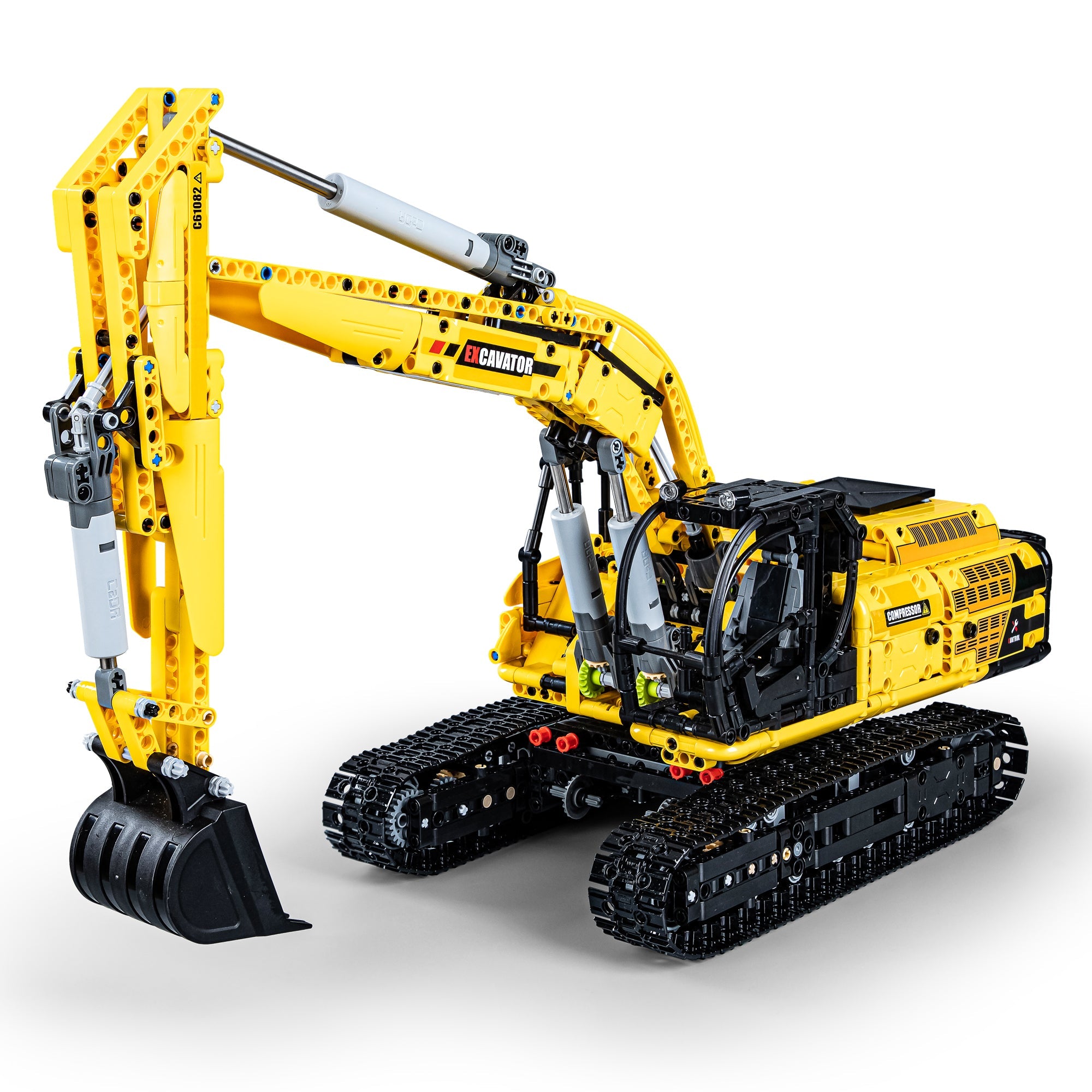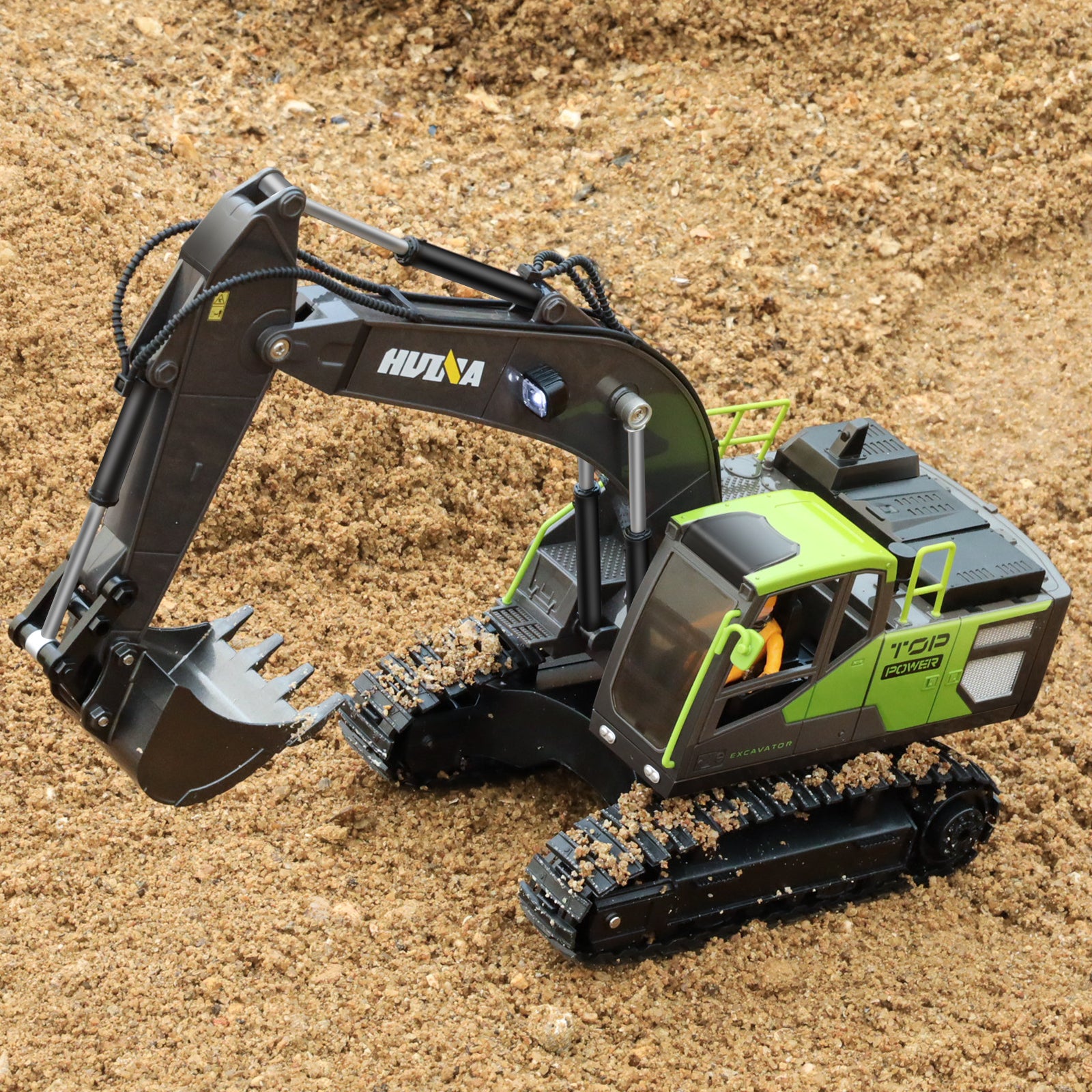Understanding the Role of a rc excavator in Large-Scale Construction Projects
Wiki Article
Understanding Exactly How Excavator Works and Its Effect On Efficiency
Excavators play an important function in building and mining operations, depending on a complex interaction of hydraulic and mechanical systems. Their capacity to perform a selection of jobs rests on both their design and the innovation incorporated within. Comprehending these parts can greatly affect functional efficiency and efficiency. As advancements proceed to improve the sector, one should take into consideration how these changes will certainly affect future methods and efficiency.The Fundamentals of Excavator Mechanics

The Duty of Hydraulic Solutions in Excavators
At the heart of excavator operation lies the hydraulic system, which plays a critical role in powering the maker's activities and functions. This system uses pressurized hydraulic liquid to move energy, enabling different activities such as training, excavating, and swinging. By taking advantage of the concepts of hydraulics, excavators can carry out jobs with remarkable precision and force, improving total functional efficiency.The hydraulic system contains crucial components, including cyndrical tubes, pumps, and shutoffs, which collaborate to control the flow and instructions of the fluid. When the operator engages the controls, the hydraulic liquid is routed to certain cylinders, translating the operator's commands into physical movement. This mechanism permits smooth and responsive actions, which are important in building and excavation atmospheres. double e volvo rc excavator. The efficiency of the hydraulic system directly affects the productivity and adaptability of the excavator, making it an indispensable element in modern excavation processesSecret Components of an Excavator
Understanding the crucial parts of an excavator is necessary for comprehending how this effective device operates. An excavator contains several substantial elements, including the undercarriage, house, boom, arm, and pail. The undercarriage offers security and wheelchair, frequently featuring wheels or tracks to navigate numerous terrains. Your home includes the engine and hydraulic systems, allowing the operator to control activity and power the equipment. The boom extends from the home, enabling upright reach, while the arm attaches to the bucket, facilitating digging and training operations.Additionally, the taxicab houses the driver, equipped with controls for exact handling. Each of these elements plays an important duty in the excavator's general capability, adding to its efficiency and efficiency on building and construction sites. Recognizing these parts assists in maximizing and keeping excavator performance, guaranteeing tasks are completed securely and properly.Accessory Versatility and Its Benefits
Add-on versatility is an essential aspect of excavators, allowing operators to switch between different devices customized for specific tasks. This versatility not just boosts task effectiveness yet also adds to cost-effectiveness by lowering the demand for numerous makers. Recognizing the various types of add-ons available can greatly impact the total performance and functionality of an excavator on work websites.Sorts of Attachments
While excavators are primarily identified for their digging capabilities, their real versatility hinges on the broad array of add-ons available. These add-ons boost the excavator's functionality, enabling it to do various jobs past excavation. Typical attachments consist of containers (for excavating and scooping), hydraulic thumbs (for grasping materials), and augers (for drilling openings) Grapples are used for moving and taking care of debris, while rippers can separate difficult surfaces. Various other specialized attachments, such as trenchers and rakes, allow excavators to adapt to particular job needs. This diversity not only enhances the machine's utility throughout various markets, consisting of demolition, construction, and landscape design, but additionally allows drivers to customize their devices to meet details task needs effectively.Boosted Task Performance
Taking full advantage of work effectiveness is a main benefit of utilizing various excavator accessories. Various add-ons enable an excavator to perform several tasks without needing to switch equipment, saving beneficial time and labor. Utilizing a hydraulic hammer can damage concrete while a container add-on can dig deep into soil, making it possible for a seamless process. This flexibility lowers downtime connected with tools changes and improves performance on-site. In addition, specialized attachments enhance precision in jobs such as grading or landscape design, resulting in better end results. The ability to adapt to different job requirements not only enhances procedures however likewise reduces the demand for additional equipment, guaranteeing that projects are finished quickly and properly. On the whole, attachment convenience substantially contributes to enhanced task effectiveness in excavation work.Cost-Effectiveness and Flexibility
Cost-effectiveness is a considerable benefit of utilizing flexible excavator attachments. These attachments enable a solitary excavator to execute multiple jobs, lowering the requirement for additional machinery and labor - double e volvo rc excavator. By switching between pails, hammers, and grapples, drivers can deal with various projects, from excavating to demolition, consequently making the most of devices utilization. This versatility not just decreases operational expenses but also decreases downtime connected with changing tools. Additionally, the ability to customize excavators with specialized add-ons improves performance, as they can efficiently manage diverse tasks according to project needs. In conclusion, the combination of cost-effectiveness and flexibility in excavator attachments adds to enhanced functional effectiveness and resource appropriation in building and construction and excavation projects
Advanced Innovation in Modern Excavators
Modern excavators are progressively equipped with advanced modern technology that changes excavation processes. Automation streamlines procedures, while enhanced gas effectiveness lowers functional expenses. Additionally, clever control systems enhance precision and safety and security, noting a substantial advancement in excavation tools.Automation in Excavation Processes
As excavation modern technology advances, automation has emerged as an important part in enhancing performance and precision on job sites. Modern excavators are geared up with sophisticated automated systems that assist in jobs such as grading, excavating, and trenching with marginal operator intervention. These systems use sensing units, GPS, and equipment discovering algorithms to guarantee exact placing and deepness control, greatly reducing the margin for error. In addition, automation permits drivers to concentrate on tactical decision-making instead of manual controls, bring about improved efficiency on the whole. Such technologies not only streamline workflows but additionally improve safety and security by lessening human mistake in complex procedures. The integration of automation in excavation processes stands for a considerable advancement in building and construction technology, driving the market towards better efficiency and effectiveness.Enhanced Gas Efficiency
Advancements in modern technology have additionally caused substantial enhancements in fuel efficiency for contemporary excavators. Modern machines are geared up with advanced engines that optimize power output while minimizing fuel usage. These engines make use of cutting-edge combustion technologies, such as turbocharging and direct gas injection, to enhance efficiency and effectiveness. Furthermore, light-weight materials in building minimize general weight, permitting less power expenditure throughout operation. The intro of variable speed controls allows operators to change engine efficiency according to details jobs, even more lessening fuel use. Because of this, these improvements not just lower functional prices however also contribute to ecological sustainability by decreasing emissions. Related Site On the whole, boosted fuel performance in excavators is an important development that bolsters productivity and financial viability in the building and construction market.Smart Control Solution
While drivers navigate increasingly intricate work sites, smart control systems in excavators have actually become important devices for boosting performance and accuracy. These sophisticated technologies use formulas and sensors to monitor numerous parameters such as lots weight, surface problems, and operational efficiency. By instantly adjusting hydraulic functions, clever systems enhance device performance, bring about boosted performance and decreased wear on components. In addition, drivers take advantage of intuitive interfaces that give real-time responses and diagnostics, enabling informed decision-making. This combination of innovation not just enhances procedures yet also reduces human error, contributing to more secure workplace. As the construction industry proceeds to develop, smart control systems will certainly play an essential duty fit the future of excavator efficiency and effectiveness.Enhancing Operational Performance With Excavators
Excavators play a crucial duty in boosting functional effectiveness throughout different building and excavation jobs. Their flexibility allows for numerous jobs, including product, digging, and training handling, which enhances process and minimizes the demand for additional tools. With effective hydraulic systems, excavators can do durable tasks with accuracy, substantially decreasing the moment called for to full jobs. The integration of advanced technology, such as GPS and automated controls, better maximizes their operation, enabling operators to attain greater precision and minimize material waste. Additionally, modern excavators are made to take in less gas and lessen emissions, adding to both expense financial savings and environmental sustainability. By utilizing excavators properly, construction teams can enhance performance, fulfill job due dates, and improve total website monitoring. This multifunctionality and efficiency make excavators crucial tools in the contemporary construction landscape.The Future of Excavators in Building and Mining Industries
As the construction and mining sectors develop, the future of excavators is positioned for substantial change driven by technical technology and transforming functional demands. Advancements in automation and fabricated intelligence are reshaping excavator abilities, allowing for boosted precision and effectiveness in procedures. Self-governing excavators are arising, lowering the demand for human intervention and reducing the threat of accidents.Moreover, the integration of telematics and IoT technology enables real-time tracking of maker efficiency and anticipating maintenance, enhancing uptime. Environment-friendly designs, including electric and hybrid designs, are acquiring traction, straightening with sustainability objectives within the industry.Additionally, using sophisticated products and lighter styles improves gas performance while preserving efficiency criteria. As these trends development, excavators will certainly play an essential role in meeting the increasing demands for efficiency and security in building and construction and mining, ultimately changing functional landscapes.Frequently Asked Questions
How Do Weather Conditions Influence Excavator Efficiency?

Weather problems significantly affect excavator performance, as rain and mud can prevent traction and stability, while severe temperature levels may influence hydraulic systems. Operators should adjust to these variables to assure excellent capability and security during operations.
What Safety Measures Should Operators Adhere To While Using Excavators?
Precaution for excavator drivers include putting on appropriate personal safety devices, conducting pre-operation examinations, making sure proper interaction with ground employees, preserving a secure distance from overhanging risks, and sticking to recognized functional protocols to stop accidents.Exactly How Often Should Excavators Be Preserved for Optimum Performance?
Excavators should be preserved on a regular basis to guarantee peak performance, usually every 250 operating hours or as defined by the manufacturer. Routine checks enhance dependability, stop unanticipated break downs, and prolong the life-span of the equipment.
What Is the Ordinary Lifespan of an Excavator?
The typical life-span of an excavator generally ranges from 10,000 to 15,000 hours of procedure. Variables influencing durability consist of maintenance techniques, running conditions, and the top quality of the device itself, impacting overall productivity and efficiency.my website

Can Excavators Operate Unequal Terrain Effectively?
Excavators can operate successfully on unequal surface as a result of their verbalized styles and flexible tracks. These features allow them to preserve stability and traction, enabling effective procedure in tough settings commonly come across in construction and landscape design jobs. Each of these components plays a vital duty in the excavator's general capability, contributing to its performance and performance on building websites. Making the most of task effectiveness is a key benefit of using various excavator accessories. While drivers navigate significantly complex job sites, wise control systems in excavators have arised as necessary devices for improving efficiency and precision. Excavators play a necessary duty in enhancing operational effectiveness across different building and excavation jobs. Advancements in automation and artificial intelligence are reshaping excavator capacities, have a peek at this website allowing for improved accuracy and performance in procedures.Report this wiki page